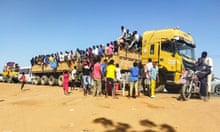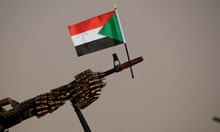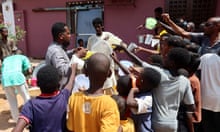At least 60 infants, toddlers and older children have perished over the past six weeks while trapped in harrowing conditions in an orphanage in Sudan’s capital as fighting raged outside.
Most died from lack of food and from fever. Twenty-six died in two days over the weekend.
The extent of the children’s suffering emerged from interviews with more than a dozen doctors, volunteers, health officials and workers at the al-Mayqoma orphanage in Khartoum. The Associated Press also reviewed dozens of documents, images and videos showing the deteriorating conditions at the facility.
Video taken by orphanage workers shows bodies of children tightly bundled in white sheets awaiting burial. In other footage, two dozen toddlers wearing only nappies sit on the floor of a room, many of them wailing, as a woman carries two metal jugs of water. Another woman sits on the floor with her back to the camera, rocking back and forth and apparently cradling a child.
An orphanage worker later explained that the toddlers were moved to the large room after nearby shelling blanketed another part of the facility with heavy dust last week.
“It is a catastrophic situation,” Afkar Omar Moustafa, a volunteer at the orphanage, said in a phone interview. “This was something we expected from day one [of the fighting].”
Among the dead were babies as young as three months, according to death certificates as well as testimony from four orphanage officials and workers for charities now helping the facility.
The weekend was particularly deadly, with 14 children perishing on Friday and 12 more on Saturday. This raised alarm and outrage across social media, and a local charity was able to deliver food, medicine and baby formula to the orphanage on Sunday, with the help of the UN children’s agency, Unicef, and the International Committee of the Red Cross.
Orphanage workers warned that more children could die, and called for their speedy evacuation out of war-torn Khartoum.
Fighting between rival military factions erupted on 15 April and has turned Khartoum and other urban areas into battlefields.
The fighting has inflicted a heavy toll on civilians, particularly children. More than 860 civilians, including at least 190 children, have been killed and thousands of others wounded, according to Sudan’s Doctors’ Syndicate, which tracks civilian casualties. The tally is likely to be much higher.
More than 1.65 million people have fled to safer areas inside Sudan or crossed into neighbouring countries. Others remain trapped inside their homes, unable to escape as food and water supplies dwindle.
More than 13.6 million children are in urgent need of humanitarian assistance in Sudan, up from nearly 9 million prior to the war, according to Unicef.

As of Monday, there were at least 341 children at the orphanage, including 165 infants between the ages of one and six months and 48 ranging from seven to 12 months. The remaining 128 children were between the ages of one and 13 years.
The situation was particularly harrowing in the first three weeks of the conflict when fighting was heaviest. At one point during this time, the children had been moved to the first floor away from windows, to avoid being hit by random fire or shrapnel, said one nurse, known as Sister Teresa.
“It looked like a prison … all of us were like prisoners unable to even look from the window. We were all trapped,” she said.
During this period, food, medicine, baby formula and other supplies dwindled because caretakers were unable to get out and seek help, said Heba Abdalla, who had arrived at the orphanage as a child and became a nurse there. “On many days, we couldn’t find anything to feed [the children],” she said. “They were crying all the time because they were hungry.”
The government-run facility is in a three-storey building with a playground in the Daym area in central Khartoum. The area has experienced some of the fiercest fighting, with stray shells and bullets hitting nearby homes and other civilian infrastructure.
Nazim Sirag, an activist who heads the local charity Hadhreen, said the situation remained difficult, and orphanage workers called for the children to be moved out of Khartoum. Otherwise, said Abdalla, “you don’t know what will happen tomorrow”.








